Happiness
- 格式:pdf
- 大小:183.58 KB
- 文档页数:7
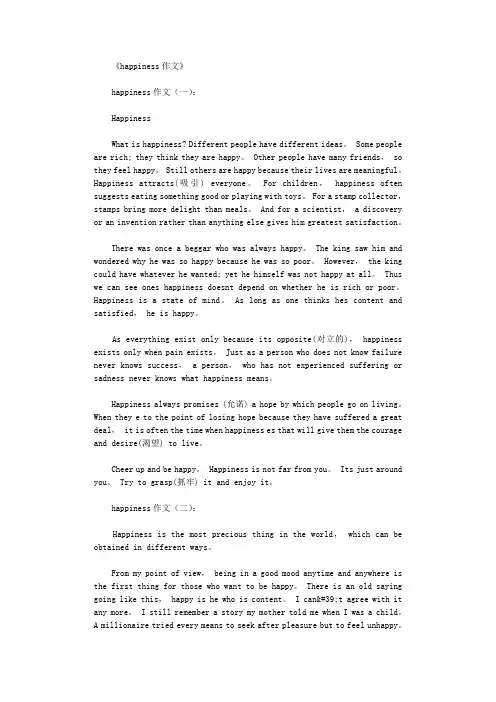
《happiness作文》happiness作文(一):HappinessWhat is happiness? Different people have different ideas。
Some people are rich; they think they are happy。
Other people have many friends, so they feel happy。
Still others are happy because their lives are meaningful。
Happiness attracts(吸引) everyone。
For children,happiness often suggests eating something good or playing with toys。
For a stamp collector,stamps bring more delight than meals。
And for a scientist, a discovery or an invention rather than anything else gives him greatest satisfaction。
There was once a beggar who was always happy。
The king saw him and wondered why he was so happy because he was so poor。
However, the king could have whatever he wanted; yet he himself was not happy at all。
Thus we can see ones happiness doesnt depend on whether he is rich or poor。
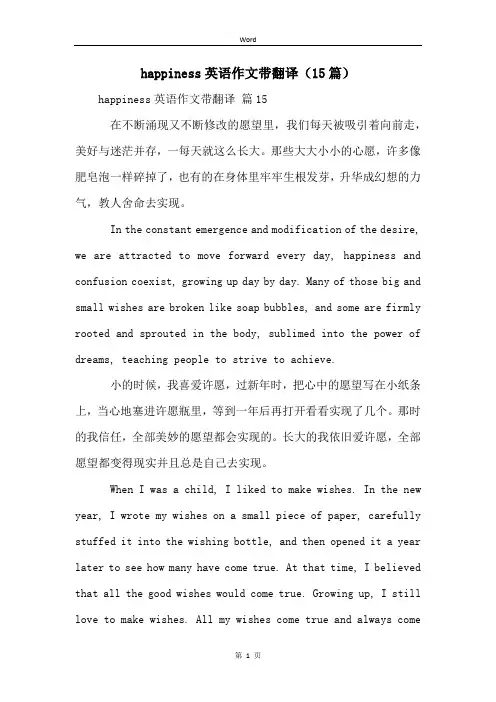
happiness英语作文带翻译(15篇)happiness英语作文带翻译篇15在不断涌现又不断修改的愿望里,我们每天被吸引着向前走,美好与迷茫并存,一每天就这么长大。
那些大大小小的心愿,许多像肥皂泡一样碎掉了,也有的在身体里牢牢生根发芽,升华成幻想的力气,教人舍命去实现。
In the constant emergence and modification of the desire, we are attracted to move forward every day, happiness and confusion coexist, growing up day by day. Many of those big and small wishes are broken like soap bubbles, and some are firmly rooted and sprouted in the body, sublimed into the power of dreams, teaching people to strive to achieve.小的时候,我喜爱许愿,过新年时,把心中的愿望写在小纸条上,当心地塞进许愿瓶里,等到一年后再打开看看实现了几个。
那时的我信任,全部美妙的愿望都会实现的。
长大的我依旧爱许愿,全部愿望都变得现实并且总是自己去实现。
When I was a child, I liked to make wishes. In the new year, I wrote my wishes on a small piece of paper, carefully stuffed it into the wishing bottle, and then opened it a year later to see how many have come true. At that time, I believed that all the good wishes would come true. Growing up, I still love to make wishes. All my wishes come true and always cometrue by myself.听到过这样一句话,许愿就是向将来开一张支票。
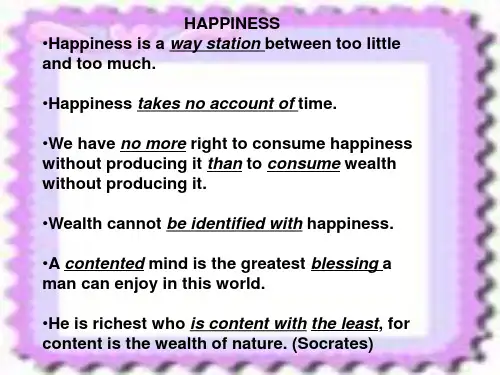
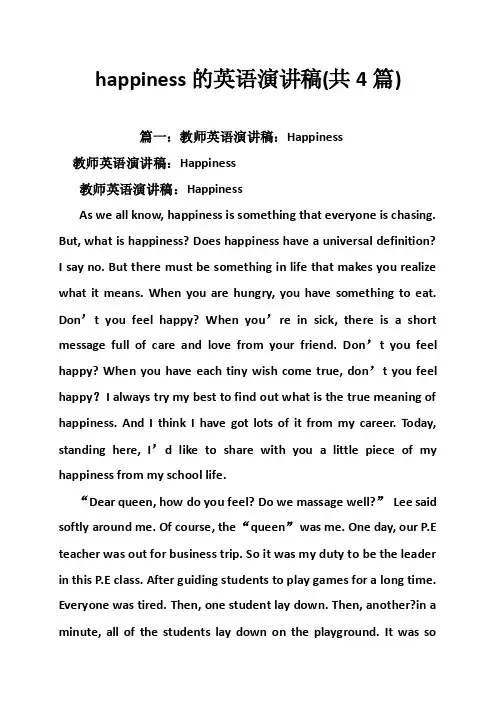
happiness的英语演讲稿(共4篇)篇一:教师英语演讲稿:Happiness教师英语演讲稿:Happiness教师英语演讲稿:HappinessAs we all know, happiness is something that everyone is chasing. But, what is happiness? Does happiness have a universal definition?I say no. But there must be something in life that makes you realize what it means. When you are hungry, you have something to eat. Don’t you feel happy? When you’re in sick, there is a short message full of care and love from your friend. Don’t you feel happy? When you have each tiny wish come true, don’t you feel happy?I always try my best to find out what is the true meaning of happiness. And I think I have got lots of it from my career. Today, standing here, I’d like to share with you a little piece of my happiness from my school life.“Dear queen, how do you feel? Do we massage well?”Lee said softly around me. Of course, the “queen”was me. One day, our P.E teacher was out for business trip. So it was my duty to be the leader in this P.E class. After guiding students to play games for a long time. Everyone was tired. Then, one student lay down. Then, another?in a minute, all of the students lay down on the playground. It was soenjoyable for me to see such a great situation, as in the classroom our lovely guys always sit properly to show their poritive attitudes. The sun was shining. The wind was blowing. Smelling the faint smell of flowers, I couldn’t help closing my eyes and lying on my back. Suddently, a tiny hand touched my arm. “Queen, you must be tired after a day’s work. Right? I’m your faithful maid. Let me serve for you.”Then, the other students came over to sit and serve around me. Head, neck, leg. Wow, that was really a great happiness to have such an experience.Dear friends, everyday we have a lot of work to do. Everyday we have a lot of things to complain. But, just like Xiao Shenyang saying, “The eyes close and open - a day is over. The eyes close but never open , all life has gone.”Time is limited. Why can’t we focus on our lovely students and keep a happy mind in the school life? Just like me. Lie down and enjoy the happiness from my kids.篇二:英语演讲稿:The Road to Happiness英语演讲稿:The Road to Happinessthe road to happinessit is a commonplace among moralists that you cannot get happiness by pursuing it. this is only true if you pursue it unwisely. gamblers at monte carlo are pursuing money, and most of them lose it instead, but there are other ways of pursuing money, which oftensucceed. so it is with happiness. if you pursue it by means of drink, you are forgetting the hangover. epicurus pursued it by living only in congenial society and eating only dry bread, supplemented by a little cheese on feast days. his method proved successful in his case, but he was a valetudinarian, and most people would need something more vigorous. for most people, the pursuit of happiness, unlesssupplemented in various ways, is too abstract and theoretical to be adequate as a personal rule of life. but i think that whatever personal rule of life you may choose it should not, except in rare and heroic cases, be incompatible with happiness. if you look around at the men and women whom you can call happy, you will see that they all have certain things in common.the most important of these things is an activity which at most gradually builds up something that you are glad to see coming into existence. women who take an instinctive pleasure in their children can get this kind of satisfaction out of bringing up a family.artists and authors and men of science get happiness in this way if their own work seems good to them. but there are many humbler forms of the same kind of pleasure. many men who spend their working life in the city devote their weekends to voluntary and uemunerated toil in their gardens, and when the spring comes, theyexperience all thejoys of having created beauty. the whole subject of happiness has, in my opinion, been treated too solemnly.it had been thought that man cannot be happy without a theory of life or a religion. perhaps those who have been rendered unhappy by a bad theory may need a better theory to help them to recover, just as you may need a tonic when you have been ill. but when things are normal a man should be healthy without a tonic and happy without a theory. it is the simple things that really matter. if a man delights in his wife and children, has success in work, and finds pleasure in the alternation of day and night, spring and autumn, he will be happy whatever his philosophy may be. if, on the other hand, he finds his wife fateful, his children’s noise unendurable, and the office a nightmare; if in the daytime he longs for night, and at night sighs for the light of day, then what he needs is not a new philosophy but a new regimen--a different diet, or more exercise, or what not. man is an animal, and his happiness depends on his physiology more than he likes to think. this is a humble conclusion, but i cannot make myself disbelieve it. unhappy businessmen, i am convinced, wouldincrease their happiness more by walking six miles every day than by any conceivable change of philosophy.thangk you.篇三:The road to happiness 英文演讲稿The road to happinessGood morning/afternoon distinguished judges and my fellow students. I am ..from..##. I am going to start my speech with a question. How can we harvest happiness? As for this question, most of you have thought about it incidentally or purposefully. While have you figured out the way? Next, I will share my understanding of this question. For me, the road to happiness is the way to fight for my goals and desires. As a matter of fact, I have been on the road to happiness from the moment I was born.When I was 5, I racked my brains(绞尽脑汁)to get a Barbie doll or a teddy bear. In order to get them, I was willing to attend the piano class which actually was the last thing I wanted to do. However, on thinking of my little dolls, I forgot all the pains in the piano class. I deeply believed that I was realizing my happiness, and I was on the road to my happiness.When I was 10,I was fascinated by the title of NO.1 which could bring me a huge sense of success. TO be the NO.1, I sacrificed my rest time to attend all kinds of training classes, and I saved my pocket money to afford reference books. These might sound painful for most 10 years old children. But as long as I achieved my goal, Ithought I was on the road to happiness.When I was 15, I became an enthusiast of painting. I enjoyed the way to express myself by means of different colors.. with a strong desire to improve my painting techniques, I attend a painting class. I travelled between the painting center and my home for hours. What is more, none of my t-shirts and skirts could have a narrow escape from those pigments. However, I still felt happy, because I was fighting for my desire little by little.Time flies. I am 20-year-old now. by comparison with 5-yeae-old and ten-year-old, I harvest more desired things, such as love form friends, care from teachers and CDs signed by celebrities. The feeling is always the same. By this time, I realize that as long as I fight for my goals and desires, I will feel excited, fulfilled and satisfied. Today, my goal is to present a perfect a speech to all of you. Now I am working on it. Hence I can say I am harvesting happiness, and I am on the road to happiness.单词Distinguished 尊贵的尊敬的Attend 参加Fascinated 着迷的Sacrificed 牺牲reference books. 参考书enthusiast 狂热分子express 表达pigments 颜料celebrities 名人尽量减慢语速,对内容要非常熟悉,我满读了一下用了7分钟,如果觉得字数不够再自己加一点。
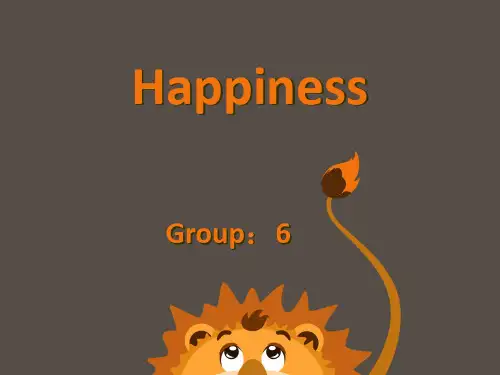
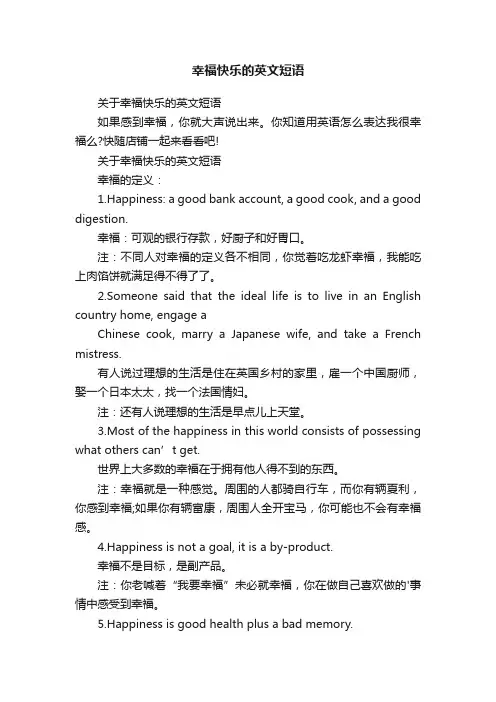
幸福快乐的英文短语关于幸福快乐的英文短语如果感到幸福,你就大声说出来。
你知道用英语怎么表达我很幸福么?快随店铺一起来看看吧!关于幸福快乐的英文短语幸福的定义:1.Happiness: a good bank account, a good cook, and a good digestion.幸福:可观的银行存款,好厨子和好胃口。
注:不同人对幸福的定义各不相同,你觉着吃龙虾幸福,我能吃上肉馅饼就满足得不得了了。
2.Someone said that the ideal life is to live in an English country home, engage aChinese cook, marry a Japanese wife, and take a French mistress.有人说过理想的生活是住在英国乡村的家里,雇一个中国厨师,娶一个日本太太,找一个法国情妇。
注:还有人说理想的生活是早点儿上天堂。
3.Most of the happiness in this world consists of possessing what others can’t get.世界上大多数的幸福在于拥有他人得不到的东西。
注:幸福就是一种感觉。
周围的人都骑自行车,而你有辆夏利,你感到幸福;如果你有辆富康,周围人全开宝马,你可能也不会有幸福感。
4.Happiness is not a goal, it is a by-product.幸福不是目标,是副产品。
注:你老喊着“我要幸福”未必就幸福,你在做自己喜欢做的'事情中感受到幸福。
5.Happiness is good health plus a bad memory.幸福就是好身体加上坏记性。
注:你们家房子着火了,你去邻居家找洗脸盆接水,结果被新闻联播吸引住了,把着火的事儿了给忘了。
带着感恩的心去生活,快乐自然洋溢。
6.Everyday is a gift.每天都是一个礼物。
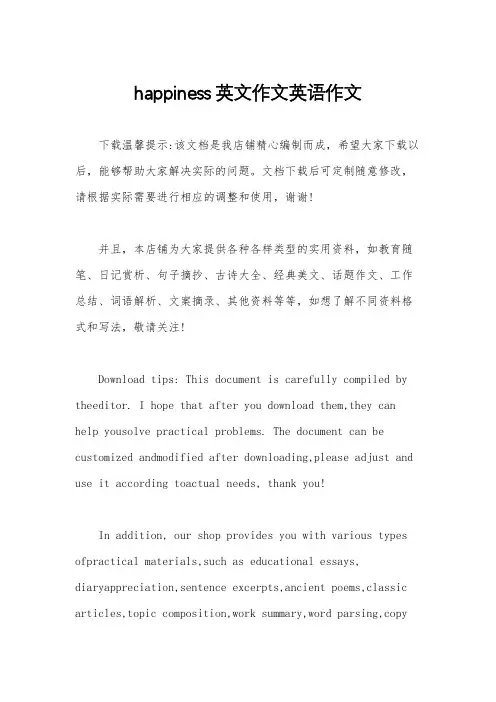
happiness英文作文英语作文下载温馨提示:该文档是我店铺精心编制而成,希望大家下载以后,能够帮助大家解决实际的问题。
文档下载后可定制随意修改,请根据实际需要进行相应的调整和使用,谢谢!并且,本店铺为大家提供各种各样类型的实用资料,如教育随笔、日记赏析、句子摘抄、古诗大全、经典美文、话题作文、工作总结、词语解析、文案摘录、其他资料等等,如想了解不同资料格式和写法,敬请关注!Download tips: This document is carefully compiled by theeditor. I hope that after you download them,they can help yousolve practical problems. The document can be customized andmodified after downloading,please adjust and use it according toactual needs, thank you!In addition, our shop provides you with various types ofpractical materials,such as educational essays, diaryappreciation,sentence excerpts,ancient poems,classic articles,topic composition,work summary,word parsing,copyexcerpts,other materials and so on,want to know different data formats andwriting methods,please pay attention!Happiness is a feeling that everyone wants to experience. It's like a warm ray of sunshine that brightens up your day and makes you feel alive.For some people, happiness comes from spending time with loved ones. Whether it's a family gathering, a night out with friends, or a romantic date, the joy of being surrounded by people who care about you can be truly uplifting.Others find happiness in pursuing their passions and hobbies. Whether it's painting, playing a musical instrument, or simply going for a run, engaging inactivities that bring you joy and fulfillment can be a source of immense happiness.Sometimes, happiness can be found in the simplest of things. A good cup of coffee in the morning, a beautiful sunset, or a cozy evening spent reading a book can allbring a sense of contentment and happiness.Happiness is also about finding gratitude in everyday life. Being thankful for what you have, rather than focusing on what you lack, can lead to a more positive outlook and a greater sense of happiness.Ultimately, happiness is a personal and subjective experience. What brings joy to one person may not have the same effect on another. But no matter what form it takes, the pursuit of happiness is a universal human endeavor.。
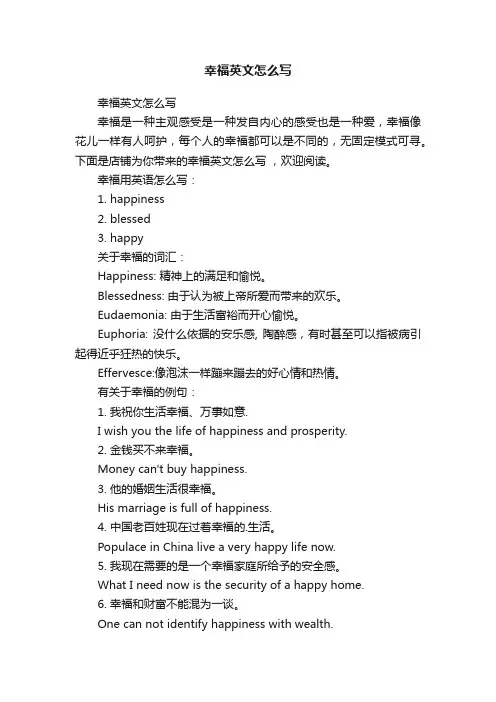
幸福英文怎么写幸福英文怎么写幸福是一种主观感受是一种发自内心的感受也是一种爱,幸福像花儿一样有人呵护,每个人的幸福都可以是不同的,无固定模式可寻。
下面是店铺为你带来的幸福英文怎么写,欢迎阅读。
幸福用英语怎么写:1. happiness2. blessed3. happy关于幸福的词汇:Happiness: 精神上的满足和愉悦。
Blessedness: 由于认为被上帝所爱而带来的欢乐。
Eudaemonia: 由于生活富裕而开心愉悦。
Euphoria: 没什么依据的安乐感, 陶醉感,有时甚至可以指被病引起得近乎狂热的快乐。
Effervesce:像泡沫一样蹦来蹦去的好心情和热情。
有关于幸福的例句:1. 我祝你生活幸福、万事如意.I wish you the life of happiness and prosperity.2. 金钱买不来幸福。
Money can't buy happiness.3. 他的婚姻生活很幸福。
His marriage is full of happiness.4. 中国老百姓现在过着幸福的.生活。
Populace in China live a very happy life now.5. 我现在需要的是一个幸福家庭所给予的安全感。
What I need now is the security of a happy home.6. 幸福和财富不能混为一谈。
One can not identify happiness with wealth.7. 人生幸福易逝。
Human happiness is so fragile.8. 她把幸福和有钱联想到一起。
She associated happiness with having money.9.一个懒汉永远找不到也永远不懂得真正的幸福.An idle person will never find or understand real happiness.10.这位诗人晚年过着一种幸福的生活.The poet lived a happy life in his later life.11.当我看到这些照片的时候,幸福的往事涌上我的心头。
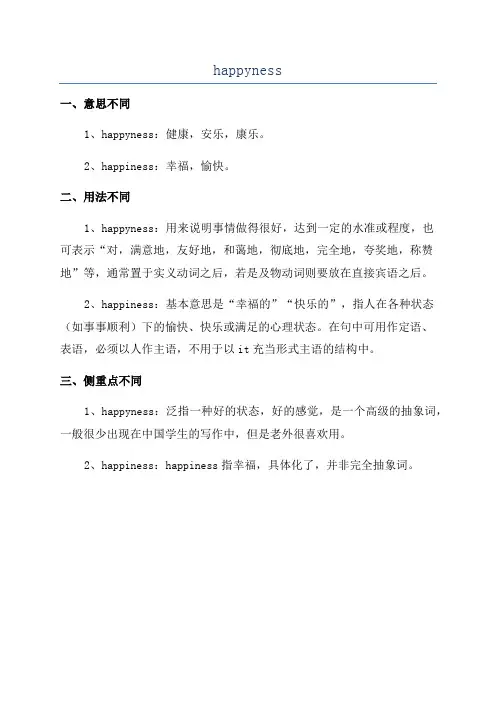
happyness
一、意思不同
1、happyness:健康,安乐,康乐。
2、happiness:幸福,愉快。
二、用法不同
1、happyness:用来说明事情做得很好,达到一定的水准或程度,也
可表示“对,满意地,友好地,和蔼地,彻底地,完全地,夸奖地,称赞地”等,通常置于实义动词之后,若是及物动词则要放在直接宾语之后。
2、happiness:基本意思是“幸福的”“快乐的”,指人在各种状态(如事事顺利)下的愉快、快乐或满足的心理状态。
在句中可用作定语、
表语,必须以人作主语,不用于以it充当形式主语的结构中。
三、侧重点不同
1、happyness:泛指一种好的状态,好的感觉,是一个高级的抽象词,一般很少出现在中国学生的写作中,但是老外很喜欢用。
2、happiness:happiness指幸福,具体化了,并非完全抽象词。
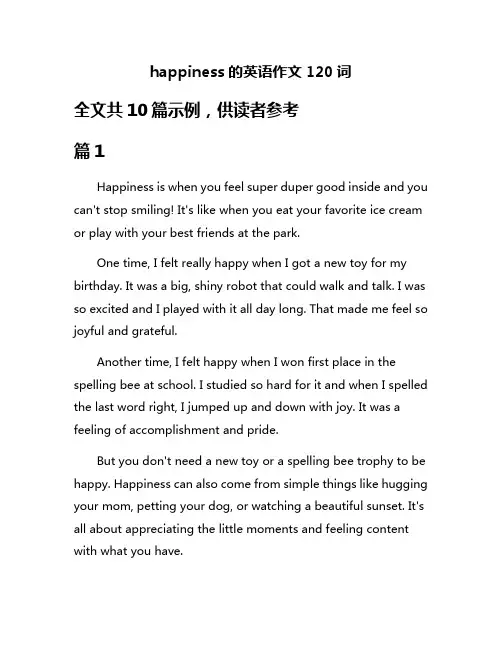
happiness的英语作文120词全文共10篇示例,供读者参考篇1Happiness is when you feel super duper good inside and you can't stop smiling! It's like when you eat your favorite ice cream or play with your best friends at the park.One time, I felt really happy when I got a new toy for my birthday. It was a big, shiny robot that could walk and talk. I was so excited and I played with it all day long. That made me feel so joyful and grateful.Another time, I felt happy when I won first place in the spelling bee at school. I studied so hard for it and when I spelled the last word right, I jumped up and down with joy. It was a feeling of accomplishment and pride.But you don't need a new toy or a spelling bee trophy to be happy. Happiness can also come from simple things like hugging your mom, petting your dog, or watching a beautiful sunset. It's all about appreciating the little moments and feeling content with what you have.So remember, happiness is all around us, we just need to open our hearts and minds to see it. And when you do, you'll feel like you're on top of the world, shining bright like a star!篇2Happiness is when you feel really, really good inside. It's like when you wake up in the morning and the sun is shining and you know it's going to be a great day. It's that warm and fuzzy feeling you get when your mom gives you a big hug or when your best friend tells you a funny joke.I think happiness is different for everyone. For me, happiness is playing with my dog in the park or eating ice cream on a hot summer day. It's also when I get a good grade on a test or when I see a rainbow in the sky. Happiness is all around us, we just have to look for it.Sometimes, when I'm feeling sad or mad, I try to think about all the good things in my life. Like my family who loves me, my friends who make me laugh, and all the fun things I get to do every day. When I focus on the good things, it makes me feel happy and grateful.I think happiness is important because it helps us feel good about ourselves and the world around us. When we're happy, wehave more energy, we smile more, and we're nicer to other people. Happiness is contagious, so when we're happy, we can spread that feeling to others too.So let's all try to find happiness in the little things every day. Whether it's dancing in the rain, making a new friend, or just enjoying a good book, let's remember to cherish those moments of happiness. Because life is too short to be anything but happy!篇3Happiness is when you feel super duper happy and your heart feels like it's doing a happy dance! There are so many things that can bring happiness, like playing with your friends, eating your favorite ice cream, or getting a big hug from your mom or dad.One of the things that make me really happy is when I get to play outside with my friends. We run around, play games, and just have a lot of fun together. It's really nice to have friends who make you laugh and smile.Another thing that makes me happy is when I get to eat my favorite ice cream. I love chocolate ice cream with sprinkles on top! It's so yummy and makes me feel so happy inside.And of course, getting a big hug from my mom or dad is the best feeling in the whole wide world. They give me the best hugs ever and I always feel so loved and happy when they hug me tight.So, happiness is all about feeling joyful, loved, and full of smiles. It's the best feeling ever and I hope everyone gets to experience happiness every single day! Let's all spread happiness and make the world a brighter and happier place!篇4Happiness is the best feeling in the whole wide world! It makes you feel all warm and fuzzy inside, like when you get a big hug from your best friend. I think happiness is like a sunshine that shines bright and makes everything colorful.I feel happy when I play with my friends at the playground. We swing, slide, and laugh together. It's so much fun! And when we share our snacks, it makes me even happier. I also feel really happy when I see my family smiling and having a good time. Their smiles are like magic, they make me feel so loved and happy.Sometimes, I find happiness in the little things, like when I see a rainbow in the sky after it rains, or when my pet dogsnuggles with me on the couch. Those moments make me feel so grateful and happy. And when I do something nice for someone else, like sharing my toys or helping my mom with chores, it makes me feel really happy too.I think happiness is all around us, we just need to notice and appreciate it. It's like a special gift that we can give ourselves and others. So let's spread happiness wherever we go and make the world a happier place!篇5Happiness is a feeling we all want to have, right? It's like that warm, fuzzy feeling you get when everything is going just right. It's like sunshine on a rainy day, or a big hug from your best friend. Happiness is something that makes you smile from the inside out.When I think about happiness, I think about all the things that make me happy. Like playing with my friends at recess, or snuggling up with my favorite book before bed. I also feel happy when I help someone else, like when I share my crayons with my classmates or pick up trash on the playground. Making others happy makes me happy too!Another thing that makes me happy is spending time with my family. We go on fun adventures together, like picnics in the park or bike rides in the neighborhood. We laugh and play games and just enjoy being together. Family time is the best time!But happiness isn't just about fun and games. It's also about feeling grateful for what you have. I feel happy when I think about all the good things in my life, like my home, my school, and my toys. I know that not everyone has these things, so I try to appreciate them every day.So, happiness is all around us if we just look for it. It's in the little moments of joy, the acts of kindness, and the love of family. Remember to count your blessings and spread happiness wherever you go. After all, a smile is a universal language that can brighten anyone's day.篇6Hey guys, today I want to talk about happiness! Happiness is a super important thing in life, right? It's like when you feel soooo good and everything is awesome! There are lots of things that can make us happy, like playing with friends, eating yummy food, or getting a good grade in school.First of all, playing with friends is the best! When we're with our buddies, we can laugh, run around, and have fun together. It's great to have someone to share our happy moments with. And don't forget about eating tasty food! Who doesn't love a yummy snack or a delicious meal? Food can make us feel so happy and satisfied.Oh, and when we do well in school, it's like a big boost of happiness! Getting good grades or finishing a project can make us feel so proud of ourselves. It's like all our hard work paid off and we're super happy about it.But remember, happiness is not just about fun stuff or achievements. It's also about feeling grateful, being kind to others, and appreciating the little things in life. So let's try to spread happiness wherever we go and make the world a happier place!In conclusion, happiness is like a big warm hug that makes us feel all fuzzy inside. Let's cherish the happy moments, create more happy memories, and share our happiness with others. Remember, happiness is contagious, so let's spread it like confetti! Stay happy, guys!篇7Happiness is when you feel super duper good inside. It's like when you eat your favorite ice cream or when you get to play with your best friends all day long. It's a warm and fuzzy feeling that makes your heart sing and your face smile.I think happiness comes from doing things that make you happy. Like drawing your favorite picture, playing with your cute puppy, or dancing to your favorite song. It's all about doing what you love and loving what you do.Happiness is also about being grateful for the little things in life. Like when your mom makes your favorite snack or when your dad reads you a bedtime story. It's those small moments that make life so special.I believe that happiness is contagious. When you're happy, you spread that happiness to others around you. Whether it's giving a big hug to your friend or sharing your favorite toy, spreading joy to others can make you even happier.So, let's all try to find happiness in the little things, spread joy to everyone we meet, and always remember that the key to happiness is right in our own hearts. Let's all be happy together!篇8Happiness is like a big, warm hug that makes you feel all cozy inside. It's like your favorite yummy treat that makes your tummy dance with joy. When you're happy, you feel like you're flying on a magical unicorn through a rainbow-filled sky!There are so many things that can make us happy. Like playing with our friends at recess, running around and giggling until our tummies hurt. Or when we get a gold star on our spelling test and our teacher gives us a big high-five. Happiness is also when we cuddle with our fluffy pet at home, feeling their warm fur against our cheek.But happiness isn't just about big things, it's also about the little moments that make our hearts smile. Like when we see a beautiful flower blooming in the garden, or when we share a secret joke with our best friend. Happiness is all around us, we just need to open our eyes and hearts to feel it.And you know what? When we're happy, we spread happiness to others too! Our smiles are like sunshine on a cloudy day, brightening up someone else's world. So let's choose happiness every day, and make the world a happier, brighter place for everyone!篇9Happiness is a super duper important thing in life. It’s like a big, warm hug that makes everything feel just right. When you’re happy, you feel like you’re flying on a rainbow and everything around you is all shiny and sparkly.For me, happiness comes from the little things in life. Like playing with my friends at recess, or eating a yummy ice cream cone on a hot sum mer day. It’s also when I get a good grade on a test or when my mom tells me she’s proud of me. Those moments make my heart feel all warm and fuzzy inside.But happiness is not just about feeling good, it’s also about spreading joy to others. Like when I share my toys with my little sister or help my grandma with her crossword puzzles. Making someone else smile makes me feel all happy and bubbly too.I think we should all try to find happiness in our everyday life. Whether it’s singing your favorite song at the top of your lungs or dancing like nobody’s watching. Remember, happiness is contagious, so spread it around like confetti!In conclusion, happiness is like a sunshine on a rainy day, it brightens up everything around you. So let’s all chas e after happiness and make the world a brighter and happier place. Remember, happiness is a choice, so choose to be happy every day!篇10Happiness is when you feel super duper good inside and everything is just A-OKAY! It's like when the sun is shining, the birds are chirping, and you just can't stop smiling. So, what exactly is happiness and how can we get more of it in our lives?Well, happiness can mean different things to different people. For some, it might be playing with your best buddies on the playground. For others, it could be snuggling up with a good book and a cozy blanket. Whatever makes your heart feel warm and fuzzy, that's happiness!But how can we make sure we have lots of happiness in our lives? One way is to do things that make us feel good, like helping out a friend in need or sharing a yummy snack with someone who's hungry. It's all about spreading kindness and joy wherever you go!Another way to bring more happiness into your life is to focus on the positive things around you. Instead of worrying about what you don't have, try to appreciate all the wonderful things you do have, like your family, your friends, and all the cool toys in your room.So, let's all make a promise to ourselves to choose happiness every single day. Let's smile big, laugh loud, and spread love wherever we go. Because when you're happy, the whole world shines a little bit brighter!。
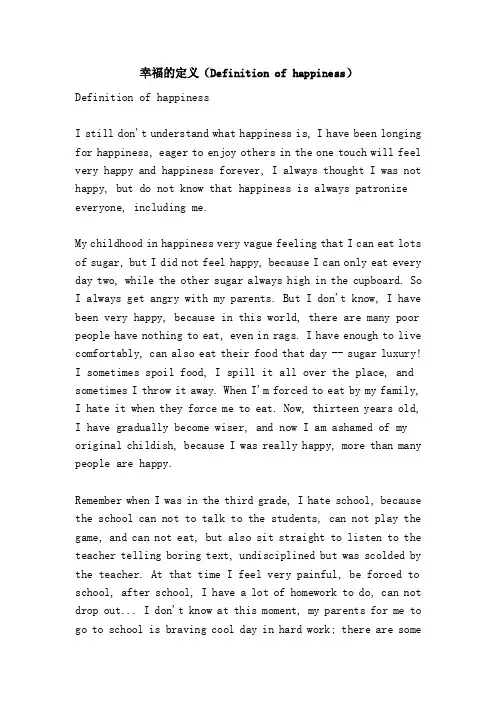
幸福的定义(Definition of happiness)Definition of happinessI still don't understand what happiness is, I have been longing for happiness, eager to enjoy others in the one touch will feel very happy and happiness forever, I always thought I was not happy, but do not know that happiness is always patronize everyone, including me.My childhood in happiness very vague feeling that I can eat lots of sugar, but I did not feel happy, because I can only eat every day two, while the other sugar always high in the cupboard. So I always get angry with my parents. But I don't know, I have been very happy, because in this world, there are many poor people have nothing to eat, even in rags. I have enough to live comfortably, can also eat their food that day -- sugar luxury!I sometimes spoil food, I spill it all over the place, and sometimes I throw it away. When I'm forced to eat by my family, I hate it when they force me to eat. Now, thirteen years old, I have gradually become wiser, and now I am ashamed of my original childish, because I was really happy, more than many people are happy.Remember when I was in the third grade, I hate school, because the school can not to talk to the students, can not play the game, and can not eat, but also sit straight to listen to the teacher telling boring text, undisciplined but was scolded by the teacher. At that time I feel very painful, be forced to school, after school, I have a lot of homework to do, can not drop out... I don't know at this moment, my parents for me to go to school is braving cool day in hard work; there are somepeople, they are eager to read, but because poverty, disease and other reasons to go to school. How happy I am! I don't have to worry about everything. I can come to a campus where many people dream of getting a good education.Now I feel happy, rain, I don't have to seek shelter from the rain; sick, the parents have to take good care of them; never lonely, because I have many friends and family. Perhaps many people do not know what is the definition of happiness, happiness is your ruler, happiness lies in your mind, what do you think, you have ten yuan of money, the blame will say too little money, not enough to buy what people think of Changle; contentment is happiness, because you don't have to worry about the problem of food and clothing and money.Everyone should learn to be content, we can live, is a kind of lucky, a kind of happiness, we should not put the definition of happiness is too high, it will never be happy; not contented, everyone will not feel happy existence!What is happiness anyway?Asked the same question "what is some of the girls in the eyes of your happiness?" "if a man really loves you, he can give all the happiness you want, but you do not love him, take a long time to accept him. A man love you very much, but the man does not love you, you want happiness he could not give you, only you to create, you will choose which one? "Asked the same question, different people give me different.One said, "she will choose the first one, because whether helikes it or not, he only wants happiness, and when he is alive, he will be satisfied as long as he is happy."." This answer is very practical, once again lamented this passionate world, a person living in this world, what is the purpose? Happiness is the longing of a woman, and a beloved man can live a happy life of this woman is lucky, I feel a chosen girl might get happiness, because men are he has a considerate, a woman will be spoiled, want to be the man to love, if you really love the girl, will pay attention to all the images of girls, watching her all the details, the girl a love performance may produce the most romantic feelings for the boy, he will not hold the release to the girl.The second answer is "like her man, she still does not like the man she likes, and she will never marry him."." I have no answer to this answer. What is happiness in her eyes?Love her man, she does not love, and the man she loves because she does not love her, she will not marry him, then her fate in the end?Love is the world's most difficult to understand something, it is only with the heart that one can feel the interaction between men and women, outsiders just a bystander, sad will comfort you, success, only for your blessing, how many people have a romantic, many people have a solemn pledge of love,How many people have taken in kind of lies, the words will lead to divorce.The third answer is "choose second, pursue the man she likes."."This world what needs to create, the road of life is out of their own way, in a riot of colour flowers, only one is their own, must determine which one is own before picking, this flower is your life partner.Happiness is their pursuit, for this initiative to pursue the man who love the girl, I can only admire, admire in at the same time it will worry, because men are changing feelings, proud of him will appear in the future life, happiness can represent the future happiness?Also asked many people for the happy two understanding of the word, the answer is all sorts of strange things, but it is worth mentioning is below two.I asked, "what is happiness?""A life of stability"Ask, "what is a secure life?""A "love me, love the family, love children." this condition is perhaps the world's most simple but it is very simple, as long as the answer is a man that will do, but it is worth asking is "never in love or love only one party of the other party how can I give people the most simple, most want happiness?"Second kinds of understanding of happiness, I ask "what is happiness?" answer "love with the beloved man," and ask, "who is your beloved man?" answer, "do not hit me, do not scold me, love my life."." This is a very simple answer, like the stars,the moon touched so Arabian Nights, today found that women want happiness is so simple, but why in this world, there will still be not because of love each other for a scolding finally divorced, the woman is too demanding, or even these men the most simple requirements are unable to do it?A woman is so understanding of philosophy, "the woman before the engagement, like a swallow, how does love fly, a woman engaged like Dove, can fly, it can't fly away, a woman after marriage like ducks, but has been unable to fly." So at the moment your husband will become what look like? "The husband is premarital early appointment, marriage always comes home late at night, the husband is premarital to you often swear, married to you often get angry people, husband is often work for you before marriage, marriage often person tells you what to do."Man, who has been married all his life, how do you understand happiness before you have made a break into marriage?Today, I still ask my friends the old saying. "What's your idea of happiness?" "if a man who really loves you, he can give you all the happiness you want, but you don't like him very much. It takes a long time to accept him.". A man whom you like very much, but that man doesn't like you very much. The happiness that you want, he can't give you at all, only you try hard to create, which one will you choose?"In the desert, the traveler said, "happiness is a sweet spring. It brings fresh coolness to the hungry and thirsty, but silently goes to dry.". The tired worker said, "happiness is a soft bed.It provides comfort and comfort to the laboring people, but it bears it silently.".The sailor on the sea said, "happiness is a beacon of light, which points out the direction of the heart for those who travel far away, but for the loneliness it endures every night.".And in the wind and rain, I do not know what happiness is, what it is, but also want to try to have happiness, but I am afraid that I have it, it will lose the luster of the past.Maybe happiness is a Durian pay songPerhaps happiness is sweet song dedicationWhat is happiness? About this problem, many people will say that happiness is their parents to obey in every way some people would say; happiness is to have food and clothing; others will say that happiness is the Chinese new year can wear beautiful new clothes. I used to think happiness means everything.But since I read the fairy tale "what is happiness" on the Internet today, my view of happiness has changed completely. The article mainly wrote three shepherd boys did a good thing, just met the daughter of wisdom, they asked the daughter of wisdom, happiness is what the wisdom of the daughter, let them explore. 10 years later, they met again. They said they were happy to do something useful to everyone through their own labor.Yes, as the daughter of wisdom said: "it is happiness to do whatis good for the people, to rely on your own labour, to do your duty well and to do good to the people.".When I struggle hard, I get excellent results,I will feel happy.When soldiers fight on the battlefield and defend their country, they feel happy.Teachers will be happy when they see their cultivated students becoming useful people in the country.When doctors save one patient after another with their great skill, they feel happy.When builders build blocks of skyscrapers from their own hands, they feel happy.......In fact, happiness is so simple. As long as you rely on your own work to do something useful to everyone, there will be a sense of touch, that is happiness.。
幸福的名言英语导读:1、没有儿童的地方就没有幸福。
——史文朋No children,no happiness。
2、幸福的首要条件在于健康。
——柯蒂斯The first condition of happiness on health。
3、醉心于某种癖好的人是幸福的。
——萧伯纳Happy is the man who is living by his hobby。
4、对于平凡人来说,平凡就是幸福。
——尼采For ordinary people,ordinary is happiness。
5、幸福,就在于创造新的生活。
——奥斯特洛夫斯基Happiness,is to create a new life。
6、人民的幸福是至高无上的法。
——西塞罗Happiness is the supreme law of the people。
7、幸福的家庭都是相似的,不幸福的家庭各有各的不幸。
——列夫·托尔斯泰Happy families are alike,unhappy family is unhappy in its own way。
8、人类一切努力的目的在于获得幸福。
——欧文The purpose of all human effort is the happiness。
9、青春之所以幸福,是因为它有前途。
——果戈里Youth is happy,because it has a future。
10、从梦幻中清醒过来是多大的幸福呀!——雨果Wide awake from the dream is how of happiness!11、做一个善良的人,为群众谋幸福。
——高尔基Do a kind person,seeks happiness for the masses。
12、遵照道德准则生活就是幸福的生活。
——亚里士多德Comply with the code of ethics life is happiness of life。
【导语】学习英语贵在坚持,找到适合⾃⼰的⽅法,多运⽤多温故。
以下“初中英语作⽂”由整理发布,欢迎阅读参考!更多相关讯息请关注! 【篇⼀】什么是幸福?What Is Happiness?People always confuse about the meaning of happiness, they don’t know how to define it. Some people think that when one has the successful career or does something that makes contribution to the society is the happiness. It is common that great acts are admired by the public and people are easy to feel the happiness. While in my opinion, happiness is very easy to achieve. When I stay with my family, we have the nice talk and I feel very happy. When I eat the delicious food that is cooked by my mother, I feel moved and happy. Happiness is around everywhere, we can feel it if we treat it right.⼈们总是对幸福的意义感到困惑,他们不知道如何去定义。
⼀些⼈认为当⼀个⼈拥有成功的事业或者对社会有所贡献的时候,才称得上幸福。
⾃然地,伟⼤的⾏为被⼤众所信服,⼈们也很容易感到幸福。
然⽽在我看来,幸福是很容易得到的。
当我和家⼈呆在⼀起时,我们聊得很愉快,我感到幸福。
幸福的英语句子1、我们走得很慢,连幸福都着急。
We walk so slowly that we are anxious for happiness.2、我想给你幸福,却走不进你的世界。
I want to give you happiness, but not into your world.3、不怕幸福迟到,只怕幸福不到!Don't be afraid of being late for happiness, just afraid of not being happy!4、她有她的幸福,我有我的快乐嘛。
She has her happiness, I have my happiness.5、不需求幸福,只想变得强大。
You don't need happiness, you just want to be strong.6、我不要你幸福,我要你活着。
I don't want you to be happy, I want you to live.7、快乐可依靠幻想,幸福却要依靠实。
Happiness depends on fantasy, but happiness depends on reality. 8、活着不多不少,幸福刚好够用。
Happiness is just enough.9、我不羡慕别人的人生,这就是幸福。
I don't envy other people's life, this is happiness.10、心的归属,决定着幸福的方向!The ownership of the heart determines the direction of happiness!11、幸福越与人共享,它的价值越增加。
The more happiness is shared with others, the more valuable it is.12、幸福就在身边,健康就是天堂。
幸福Happiness英语作文带翻译
幸福Happiness英语作文带翻译
在日复一日的学习、工作或生活中,大家或多或少都会接触过作文吧,作文是人们把记忆中所存储的有关知识、经历和思想用书面形式表达出来的记叙方式。
你知道作文怎样才能写的`好吗?下面是为大家收集的幸福Happiness英语作文带翻译,希望对大家有所帮助。
For happiness, edian Fan Wei once had such a wonderful saying: "happiness is when you are hungry, when you see someone holding a bun in his hand, he will be happier than me; when you see someone wearing a padded jacket in the cold, he will be happier than me; when you see someone smiling in the sad, he will be happier than me!" these simple humor, whether you can say that happiness and money are not necessarily linked.
对于幸福,喜剧演员范伟曾经有过这样一句妙语:“幸福是当你饿了,当你看到有人手里拿着一个馒头,他会比我幸福;当你看到有人在寒冷中穿着棉袄,他会比我幸福;当你看到有人在悲伤中微笑,他会比我幸福!”这些简单的幽默,能否说幸福和金钱不一定有联系。
happiness 幸福篇a lifetime of happiness ! no man alive could bear it ; it would be hell on earth .(g. bernard shaw ,british dramatist )终身幸福!这是任何活着的人都无法忍受的,那将是人间地狱。
(英国剧作家肖伯纳. g.) happiness is form courage .( h. jackson , british writer )幸福是勇气的一种形式。
(英国作家杰克逊. h.)happy is the man who is living by his hobby .(g. bernard shaw , british dramatist ) 醉心于某种癖好的人是幸福的。
(英国剧作家肖伯纳. g .)happiness lies not in the mere possession of money ; it lies in the joy of achievement , in the thrill of creative effort .(franklin roosevelt , american president )幸福不在于拥有金钱,而在于获得成就时的喜悦以及产生创造力的激情。
(美国总统罗斯福.f.)human felicity is produced not so much by great pieces of good fortune that seldom happen , as by little advantages that occur every day .(benjamin franklin ,american president).与其说人类的幸福来自偶尔发生的鸿运,不如说来自每天都有的小实惠。
(美国总统富兰克林. b.)most folks are about as happy as they make up their minds to be .(abraham lincoln ,american president )对于大多数人来说,他们认定自己有多幸福,就有多幸福。
1 Happiness: Between What We Want and What We Need Hokky Situngkir [hs@compsoc.bandungfe.net] Dept. Computational Sociology Bandung Fe Institute
Abstract The paper presents a very simple toy model that is simulated to experience some aspects related to what is it people want and need when related to the social happiness. By outlining some short discussions related to the distinguishing of what we call “want” and “need”, we see how both micro-social aspects may emerge the happiness as well as the urge to innovate and affinity to the collective creativity and social progress.
Keywords: happiness, want, need, social simulation.
集体的n/a创新
模仿小型的2
“You can't always get what you want! …but if you try sometimes, you might find, you get what you need” The Rolling Stones
1. Introduction Our desire on things can come from what we want and what we need. While a want is a wish, a need is a necessity [2]. Qualitatively speaking we can say that a want is further to reach, relative to the desire on needing things. For needs can be described leveled, to stay alive, people should provide their basic needs, i.e.: food, dress, and shelter. Some other secondary needs are necessary to keep the urge of staying alive. The basic needs gives life to a human being, and some other needs are necessarily to make the living. In the other hand, a want is an urge within individuals for the satisfaction, pleasure, and pleasant feeling in their lives. Thus, the need and the want are both shaping the way we keep on living in the most pleasant way.
Happiness is complex and never be a simple terminology [3]. Some works on behavioral economics are brought recently to surge what makes people happy, for collective welfare are simply emerged from happy individuals. In our case within the paper, happiness is related to the balance between two important constraints: what and how we desire things as we want and need them.
When people cannot afford what they need, the want them. But it is a commonsense that not all want is sourced from the need. Some wants, even further, are not at all related to what we need. The tendency of a want can be directly related to the people acquisition of knowledge on things. It is obvious we will never want a thing that is unknown to us.
The way people fulfill their needs is related to the local customs, values, and cultures in a community. There is a high heterogeneity when we talk about the specific things, how people provide themselves with their necessity. Culture teaches people to manage themselves on things they need for the sake of their sustainability and survivability in the society. In [4], we have discussed how social neighborhood may perplex the concavity of the demand curve, which is related to the way people feel happy or unhappy about things economically.
On the other hand, the way people fulfill their wants is related to the knowledge of larger domain in society. The larger the social network in which one is involved, there is some possibility of enlargement of their wish list based on what they want. This is related to higher possibility of tendency that might drive the urgency for achieving what they want. A thing that is good for the collective progress in the community with the risk that may reduce the “peace in mind” as to the happiness related to the way individuals weighing the needs and the wants.
These issues are discussed in the paper by proposing a very simple computational toy model and simulation that shows how the wants and the needs in society, collectively speaking, may arise to some global aspects like the average and local happiness among social agents, the clustering in social life relative to the happiness and the tendency for innovation and creativity.
2. Overview of the Simulation If one make a list of things of her needs (iω) and wants (iη
), we can map them into the real
number, ,ωη∈∈ and set their relations as inequality of,
iiωη>
[1]
集群化n
异质性使困惑中央凹陷3
where denotes the wishlist comprised by the needs and the wants, as what one wants would
always related to her wishes out of pleasure, as the things she needs are the things that would be related to necessity out of survival. Needs are things that are necessary in life, such as food, shelter, and basic necessities that we need for make a living. Common wants are represented by latest models of cell phones, plasma TV, IPod, designer jeans, luxury cars, and the like. These are our desires, but we can continue living and making it out without these in our lives. However, for people with ability covering what they need, a long list of things they desire and want might be the source of unhappiness.